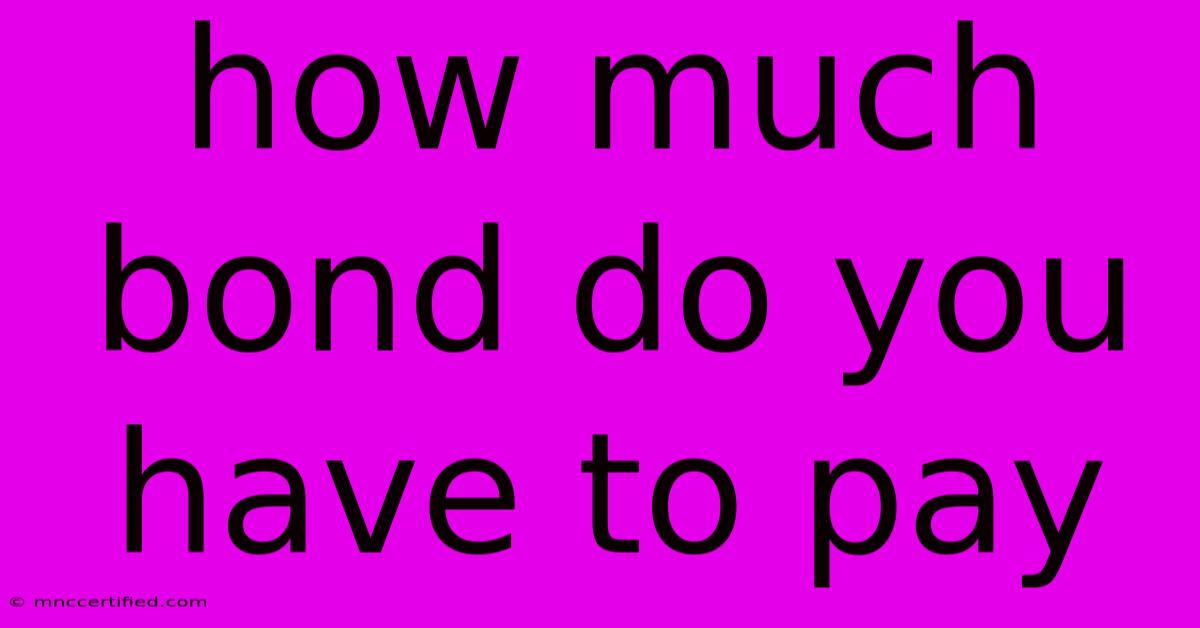How Much Bond Do You Have To Pay

Table of Contents
How Much Bond Do You Have to Pay? A Comprehensive Guide
Understanding how much bond you need to pay can be confusing. This comprehensive guide breaks down the factors influencing bond costs, offering clarity and helping you prepare for this significant financial commitment. We'll cover various bond types, influencing factors, and strategies to manage your bond payment.
What is Bond and Why Do You Pay It?
Before diving into the cost, let's clarify what a bond is. Simply put, a bond is a financial security representing a loan made by an investor to a borrower (typically a government or corporation). When you "buy" a bond, you're lending money, and the issuer promises to pay you back the principal (the original amount loaned) plus interest over a specified period.
You don't "pay" bond in the sense of a regular bill. Instead, you purchase bonds. The amount you pay is determined by several factors, and understanding these is crucial to budgeting effectively.
Factors Affecting Bond Prices (How Much You Pay)
Several key factors influence how much you'll pay for a bond:
1. Face Value (Par Value):
This is the amount the bond issuer promises to repay at maturity. It's typically $1,000, but can vary. This is your principal investment.
2. Coupon Rate:
This is the annual interest rate the bond issuer pays. It's usually expressed as a percentage of the face value and paid periodically (e.g., semi-annually). A higher coupon rate generally means higher interest payments but doesn't directly affect the initial purchase price.
3. Maturity Date:
This is the date when the bond issuer repays the principal. Longer-term bonds generally offer higher coupon rates to compensate investors for the increased risk associated with lending money for a longer period.
4. Market Interest Rates:
This is the most significant factor affecting the price you pay for a bond. If market interest rates rise after you purchase a bond with a fixed coupon rate, your bond becomes less attractive, and its price will fall. Conversely, if market rates fall, your bond's price will rise. This is because investors will demand a higher price for a bond offering a lower coupon rate than what's currently available in the market.
5. Credit Rating:
The creditworthiness of the bond issuer significantly impacts the price. Bonds issued by entities with higher credit ratings (e.g., AAA) are considered less risky and typically command lower yields (interest rates) and higher prices than bonds issued by entities with lower credit ratings. Higher risk = potentially lower prices but higher returns.
6. Bond Type:
Different types of bonds – such as government bonds, corporate bonds, municipal bonds – carry varying levels of risk and, consequently, different prices. Government bonds are generally considered safer, while corporate bonds carry more risk.
Calculating Bond Costs: More Than Just the Face Value
It's crucial to understand that you don't always pay the face value of a bond. The actual price you pay will fluctuate based on market conditions and the factors discussed above. You might pay a premium (above face value) if market interest rates are lower than the bond's coupon rate, or a discount (below face value) if market rates are higher.
Example: A bond with a $1,000 face value and a 5% coupon rate might trade at $950 (a discount) if market interest rates are currently at 6%. Conversely, if market rates are at 4%, the bond might trade at $1,050 (a premium).
Minimizing Your Bond Investment Costs
While you can't control market interest rates, you can influence your bond investment costs by:
- Diversifying: Investing in a range of bonds with different maturities and credit ratings can mitigate risk and potentially optimize returns.
- Timing: Carefully consider market conditions before investing.
- Seeking Professional Advice: A financial advisor can help you tailor your bond portfolio to your risk tolerance and financial goals.
Conclusion: Understanding the Variables
The amount you "pay" for a bond isn't a fixed figure; it's a dynamic price influenced by many factors. By understanding these factors, you can make informed investment decisions and manage your bond portfolio effectively. Remember to consult with a financial professional for personalized advice tailored to your specific circumstances.

Thank you for visiting our website wich cover about How Much Bond Do You Have To Pay. We hope the information provided has been useful to you. Feel free to contact us if you have any questions or need further assistance. See you next time and dont miss to bookmark.
Featured Posts
-
Former Wwe Ceo Linda Mc Mahon Trumps Pick
Nov 20, 2024
-
Am I Eligible Cold Weather Payment Check
Nov 20, 2024
-
Shelter Insurance Water Valley Ms
Nov 20, 2024
-
Mobile Bonding Company Mobile Al
Nov 20, 2024
-
Argentina Victory Messi Ties Record
Nov 20, 2024